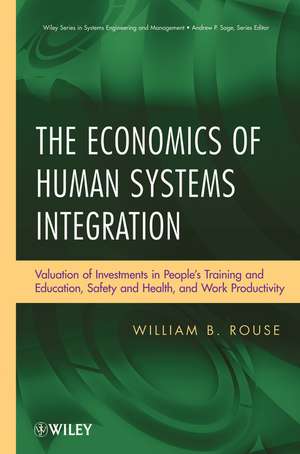The Economics of Human Systems Integration – Valuation of Investments in People′s Training and Education Safety and Health and Work Productivit: Wiley Series in Systems Engineering and Management
Autor WB Rouseen Limba Engleză Hardback – 19 aug 2010
Human Systems Integration (HSI) is a new and fundamental integrating discipline designed to help move business and engineering cultures toward more human-centered systems. Integrating consideration of human abilities, limitations, and preferences into engineering systems yields important cost and performance benefits that otherwise would not have been accomplished. In order for this new discipline to be effective, however, a cultural change--starting with organizational leadership--is often necessary.
The Economics of Human Systems Integration explains the difficulties underlying valuation of investments in people's training and education, safety and health, and work productivity. It provides an overview of how the field of economics addresses these difficulties, focusing on human issues associated with design, development, production, operations, maintenance, and sustainment of complex systems.
The set of thought leaders recruited as contributors to this volume collectively provides a compelling set of data and principles for assessing the economic value of investing in people, not just in general but in specific investment situations. The early chapters provide the contexts for HSI and investment analysis, illustrating the enormous difference context makes in how issues are best framed and analyzed. A host of practical methods and tools for investment valuation are then presented. Provided are:
-
A variety of real-world applications of economic analysis ranging from military acquisition and automotive investment to healthcare and high-tech investments in general, in both the U.S. and abroad
-
A range of economics-based methods and tools for cost analysis, cost-benefit analysis, and investment analysis, as well as sources of data for performing such analyses
-
Differing perspectives on economic decision-making, including a range of private sector points of view, as well as government and regulatory perspectives
In addition, five real-world case studies illustrate how such valuations have been done and their major impacts on investment decisions. HSI professionals, systems engineers, and finance professionals who address investment analysis will appreciate the wide range of methods and real-life applications; senior undergraduates and masters-level graduate students will find this to be an excellent textbook that provides theory and supports practice.
Din seria Wiley Series in Systems Engineering and Management
- 24%
 Preț: 601.73 lei
Preț: 601.73 lei - 24%
 Preț: 764.36 lei
Preț: 764.36 lei - 9%
 Preț: 852.35 lei
Preț: 852.35 lei - 9%
 Preț: 849.90 lei
Preț: 849.90 lei - 9%
 Preț: 895.18 lei
Preț: 895.18 lei - 9%
 Preț: 802.57 lei
Preț: 802.57 lei - 9%
 Preț: 797.31 lei
Preț: 797.31 lei - 9%
 Preț: 1167.03 lei
Preț: 1167.03 lei - 9%
 Preț: 771.10 lei
Preț: 771.10 lei - 27%
 Preț: 842.46 lei
Preț: 842.46 lei - 27%
 Preț: 1174.31 lei
Preț: 1174.31 lei - 9%
 Preț: 689.76 lei
Preț: 689.76 lei - 9%
 Preț: 802.90 lei
Preț: 802.90 lei - 9%
 Preț: 743.66 lei
Preț: 743.66 lei - 27%
 Preț: 874.77 lei
Preț: 874.77 lei - 9%
 Preț: 1046.80 lei
Preț: 1046.80 lei - 9%
 Preț: 1000.66 lei
Preț: 1000.66 lei - 9%
 Preț: 988.88 lei
Preț: 988.88 lei - 8%
 Preț: 610.38 lei
Preț: 610.38 lei - 8%
 Preț: 619.67 lei
Preț: 619.67 lei - 27%
 Preț: 1036.82 lei
Preț: 1036.82 lei - 9%
 Preț: 1361.89 lei
Preț: 1361.89 lei - 9%
 Preț: 1014.45 lei
Preț: 1014.45 lei - 27%
 Preț: 940.05 lei
Preț: 940.05 lei - 9%
 Preț: 798.00 lei
Preț: 798.00 lei - 9%
 Preț: 1318.79 lei
Preț: 1318.79 lei - 23%
 Preț: 989.45 lei
Preț: 989.45 lei - 9%
 Preț: 1105.65 lei
Preț: 1105.65 lei - 9%
 Preț: 980.16 lei
Preț: 980.16 lei - 9%
 Preț: 819.69 lei
Preț: 819.69 lei - 8%
 Preț: 538.90 lei
Preț: 538.90 lei - 8%
 Preț: 424.15 lei
Preț: 424.15 lei - 27%
 Preț: 731.44 lei
Preț: 731.44 lei - 9%
 Preț: 928.20 lei
Preț: 928.20 lei - 9%
 Preț: 973.37 lei
Preț: 973.37 lei - 9%
 Preț: 870.66 lei
Preț: 870.66 lei - 9%
 Preț: 799.81 lei
Preț: 799.81 lei - 20%
 Preț: 684.99 lei
Preț: 684.99 lei - 9%
 Preț: 930.12 lei
Preț: 930.12 lei - 9%
 Preț: 1158.97 lei
Preț: 1158.97 lei - 8%
 Preț: 611.37 lei
Preț: 611.37 lei - 32%
 Preț: 958.65 lei
Preț: 958.65 lei - 31%
 Preț: 641.10 lei
Preț: 641.10 lei - 32%
 Preț: 1012.17 lei
Preț: 1012.17 lei - 31%
 Preț: 619.02 lei
Preț: 619.02 lei - 31%
 Preț: 755.42 lei
Preț: 755.42 lei - 32%
 Preț: 677.37 lei
Preț: 677.37 lei - 32%
 Preț: 650.96 lei
Preț: 650.96 lei - 32%
 Preț: 938.63 lei
Preț: 938.63 lei
Preț: 666.99 lei
Preț vechi: 975.11 lei
-32% Nou
127.63€ • 133.61$ • 105.60£
Carte indisponibilă temporar
Specificații
ISBN-10: 0470486767
Pagini: 440
Dimensiuni: 163 x 236 x 25 mm
Greutate: 0.72 kg
Editura: Wiley
Seria Wiley Series in Systems Engineering and Management
Locul publicării:Hoboken, United States
